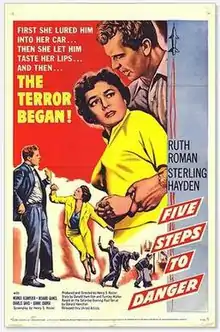5 Steps to Danger
5 Steps to Danger is a 1957 American film noir crime film directed, produced, and co–written by Henry S. Kesler.[1][2] It stars Ruth Roman[3] and Sterling Hayden,[4] with a cast that also included Werner Klemperer,[5][6] Richard Gaines,[7] Charles Davis, Jeanne Cooper, and Peter Hansen.[8][9] 5 Steps to Danger was based on the novel The Steel Mirror by Donald Hamilton.[10][11]
| 5 Steps to Danger | |
|---|---|
 Theatrical release poster | |
| Directed by | Henry S. Kesler |
| Screenplay by | Henry S. Kesler |
| Story by | Donald Hamilton Turnley Walker |
| Based on | The Steel Mirror (novel) by Donald Hamilton |
| Produced by | Henry S. Kesler |
| Starring | Ruth Roman Sterling Hayden |
| Cinematography | Kenneth Peach |
| Edited by | Aaron Stell |
| Music by | Paul Sawtell Bert Shefter |
| Color process | Black and white |
Production companies | Henry S. Kesler Productions Grand Productions |
| Distributed by | United Artists |
Release date |
|
Running time | 80 minutes |
| Country | United States |
| Language | English |
Plot
John Emmett, an American everyman, is on a fishing and hunting trip when his car breaks down. He is offered a ride by a stranger, Ann Nicholson, who is driving to Santa Fe and asks him to take turns behind the wheel.
During a stopover a woman identifying herself as a nurse takes John aside in a diner and says she has been following them because Ann is an escaped mental patient of a Dr. Frederick Simmons. And although he is not sure what to believe, John begins to doubt Ann when two policemen attempt to arrest them, claiming to be investigating a murder in Los Angeles.
John and Ann slip away. He demands the truth, whereupon Ann says she is an ex-German citizen who stumbled upon a government plot and is in possession of valuable scientific transcripts embedded on a small cosmetic mirror. In order to prevent Simmons from having Ann committed to a mental institution against her will, John asks Ann to marry him, while also declaring his love for her. They wed in a small town and then continue their journey to find the scientist who wrote the transcripts. The chase ends in a confrontation between Simmons, who is actually a Soviet spy, and his accomplices versus FBI and CIA agents, who verify Ann's story. Ann and John enjoy their honeymoon on the fishing trip John had originally planned.
Cast
- Ruth Roman as Ann Nicholson
- Sterling Hayden as John Emmett
- Werner Klemperer as Dr. Simmons
- Richard Gaines as Dean Brant
- Charles Davis as Kirk
- Jeanne Cooper as Helen Bethke
- Peter Hansen as Karl Plesser
- Karl Ludwig Lindt as Kissel (as Karl Lindt)
- John Mitchum as Deputy
- John Frederick as Sheriff (as John Merrick)
Reception
Critical response
The New York Times wrote that the film was "a rather lax and familiar melodrama about Communist espionage in this country, offers two real jolts. The climax, and this may be an unfair revelation, has a known subversive given some leeway inside a vital guided missile plant. Secondly, the place seems about as inaccessible as a drive-in restaurant. [...] The responsibility, or irresponsibility, must be shouldered by Henry S. Kesler, who handled the screenwriting, the directing and producing, and none of it very well."[4]
Release
5 Steps to Danger was released in theatres on January 30, 1957.[4]
References
- Goble 1999, p. 204.
- "5 Steps to Danger". Turner Classic Movies. Atlanta: Turner Broadcasting System (Time Warner). Retrieved May 13, 2017.
- "Ruth Roman". NNDB. United States: Soylent Communications. Retrieved May 13, 2017.
- "Palace Offers 'Five Steps to Danger'". The New York Times. New York City. January 31, 1957. Retrieved May 13, 2017.
- "Werner Klemperer". NNDB. United States: Soylent Communications. Retrieved May 13, 2017.
- Royce, Brenda Scott (1998). Hogan's Heroes : Behind the Scenes at Stalag 13! (1st ed.). Milwaukee: Renaissance Books. ISBN 978-1580630313.
- "Richard Gaines". NNDB. United States: Soylent Communications. Retrieved May 13, 2017.
- "Pter Hansen". Film Reference Library. Toronto: TIFF Bell Lightbox. Retrieved May 13, 2017.
- "Peter Hansen". NNDB. United States: Soylent Communications. Retrieved May 13, 2017.
- Hamilton, Donald (1948). The Steel Mirror. New York City: Rinehart & Company. ASIN B0007F31CC.
- Pryor, Thomas M. (January 28, 1957). "6 FILMS PLANNED BY AM-PAR CORP.: $3,000,000 Will Be Invested in Medium-Budget Movies During Next Half Year Of Local Origin". The New York Times. New York City. p. 18. Retrieved June 1, 2013.
Sources
- Goble, Alan, ed. (1999). The Complete Index to Literary Sources in Film. Berlin: De Gruyter Saur. p. 204. ISBN 978-3598114922.